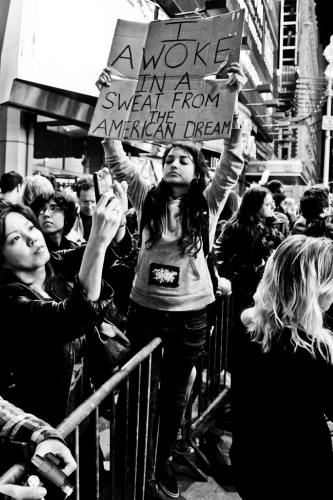|
by Chris Hedges
October 17, 2011
The faux liberal reformers, whose abject failure to stand up for the rights of the poor and the working class, have signed on to this movement because they fear becoming irrelevant. Union leaders, who pull down salaries five times that of the rank and file as they bargain away rights and benefits, know the foundations are shaking.
So do Democratic politicians from Barack Obama to Nancy Pelosi.
So do the array of “liberal” groups and institutions, including the press,
that have worked to funnel discontented voters back into the swamp of
electoral politics and mocked those who called for profound structural
reform.
These protesters in that one glorious moment did what the
traditional “liberal” establishment has steadily refused to do - fight back.
And it was deeply moving to watch the corporate rats scamper back to their
holes on Wall Street. It lent a whole new meaning to the phrase “too big to
fail.”
But the liberal class has no credibility left. It collaborated with corporate lobbyists to neglect the rights of tens of millions of Americans, as well as the innocents in our imperial wars.
The best that liberals can do is sheepishly pretend this is what they wanted all along.
Groups such as MoveOn and organized labor will find themselves without a constituency unless they at least pay lip service to the protests. The Teamsters’ arrival Friday morning to help defend the park signaled an infusion of this new radicalism into moribund unions rather than a co-opting of the protest movement by the traditional liberal establishment.
The union bosses, in short, had no choice.
photo: Daniel Oliverio The Occupy Wall Street movement, like all radical movements, has obliterated the narrow political parameters.
It proposes something new. It will not make concessions with corrupt systems of corporate power. It holds fast to moral imperatives regardless of the cost. It confronts authority out of a sense of responsibility. It is not interested in formal positions of power. It is not seeking office. It is not trying to get people to vote. It has no resources.
It can’t carry suitcases of money to congressional offices or run millions of dollars of advertisements. All it can do is ask us to use our bodies and voices, often at personal risk, to fight back. It has no other way of defying the corporate state.
This rebellion creates a real community instead
of a managed or virtual one. It affirms our dignity. It permits us to become
free and independent human beings.
King too was a radical. He would not compromise on nonviolence, racism or justice. He understood that movements - such as the Liberty Party, which fought slavery, the suffragists, who fought for women’s rights, the labor movement and the civil rights movement - have always been the true correctives in American democracy.
None of those movements achieved formal political power. But by holding fast to moral imperatives they made the powerful fear them. King knew that racial equality was impossible without economic justice and an end to militarism.
And he had no intention of ceding to the demands of the liberal establishment that called on him to be calm and patience.
King was killed in 1968 when he was in Memphis to support a strike by sanitation workers.
By then he had begun to say that his dream, the one that the corporate state has frozen into a few safe clichés from his 1963 speech in Washington, had turned into a nightmare.
King called at the end of his life for massive federal funds to rebuild inner cities, what he called,
He grasped that the inequities of capitalism had become the instrument by which the poor would always remain poor.
On the eve of King’s murder he was preparing to organize a poor people’s march on Washington, D.C., designed to cause “major, massive dislocations,” a nonviolent demand by the poor, including the white underclass, for a system of economic equality.
It would
be 43 years before his vision was realized by an eclectic group of
protesters who gathered before the gates of Wall Street.
There is more reality expressed about the American experience by the debt-burdened young men and women protesting in the parks than by all the chatter of the well-paid pundits and experts that pollutes the airwaves.
Or listen to hip-hop artist Talib Kweli:
The liberal class functions in a traditional, capitalist democracy as a safety valve.
It lets off enough steam to keep the system intact. It makes
piecemeal and incremental reform possible. This is what happened during the
Great Depression and the New Deal. Franklin Delano Roosevelt’s greatest
achievement was that he saved capitalism. Liberals in a functioning
capitalist democracy are at the same time tasked with discrediting radicals,
whether it is King, especially after he denounced the war in Vietnam, or
later
Noam Chomsky or Ralph Nader.
It thought it could shut off that safety valve in order to loot and pillage with no impediments. Corporate power forgot that the liberal class, when it functions, gives legitimacy to the power elite. And the reduction of the liberal class to silly courtiers, who have nothing to offer but empty rhetoric, meant that the growing discontent found other mechanisms and outlets.
Liberals were reduced to stick figures, part of an
elaborate pantomime, as they acted in preordained roles to give legitimacy
to meaningless and useless political theater. But that game is over.
And as the engines of corporate
power pollute and poison the ecosystem and propel us into a world where
there will be only masters and serfs, the liberal class, which serves no
purpose in the new configuration, is being abandoned and discarded by both
the corporate state and radical dissidents. The best it can do is attach
itself meekly to the new political configuration rising up to replace it.
It ensures that the frustration and anger among the working and the middle class will find expression now in these protests that lie outside the confines of democratic institutions and the civilities of a liberal democracy.
By emasculating the
liberal class, which once ensured that restive citizens could institute
moderate reforms, the corporate state has created a closed system defined by
polarization, gridlock and political charades. It has removed the veneer of
virtue and goodness that the liberal class offered to the power elite.
Liberals posit
themselves as the conscience of the nation. They permit us, through their
appeal to public virtues and the public good, to see ourselves and our state
as fundamentally good.
All hope lies now with those in the street.
The corporate state forced the liberal class to join in the nation’s death march that began with the presidency of Ronald Reagan.
Liberals such as Bill Clinton, for corporate money, accelerated the dismantling of our manufacturing base, the gutting of our regulatory agencies, the destruction of our social service programs and the empowerment of speculators who have trashed our economy.
The liberal class, stripped of power, could only
retreat into its atrophied institutions, where it busied itself with the
boutique activism of political correctness and embraced positions it had
previously condemned.
Hope in this age of bankrupt capitalism comes with the return of the language of class conflict and rebellion, language that has been purged from the lexicon of the liberal class, language that defines this new movement.
This does not mean we have to agree with Karl Marx, who advocated violence and whose worship of the state as a utopian mechanism led to another form of enslavement of the working class, but we have to learn again to speak in the vocabulary Marx employed.
We have to grasp, as Marx and Adam Smith did, that corporations are not concerned with the common good.
They exploit, pollute, impoverish, repress, kill and lie to make money. They throw poor families out of homes, let the uninsured die, wage useless wars to make profits, poison and pollute the ecosystem, slash social assistance programs, gut public education, trash the global economy, plunder the U.S. Treasury and crush all popular movements that seek justice for working men and women.
They worship money and power. And, as Marx knew, unfettered capitalism is a revolutionary force that consumes greater and greater numbers of human lives until it finally consumes itself.
The
dead zone in the Gulf of Mexico is the
perfect metaphor for the corporate state. It is part of the same nightmare
experienced in postindustrial mill towns of New England and the abandoned
steel mills of Ohio. It is a nightmare that Iraqis, Pakistanis and Afghans,
living in terror and mourning their dead, endure daily.
It signaled a step backward by the corporate state in the face of popular pressure. And it was carried out by ordinary men and women who sleep at night on concrete, get soaked in rainstorms, eat donated food and have nothing as weapons but their dignity, resilience and courage.
It is they, and they alone, who hold out the possibility of salvation.
And if we join them we might have a chance. |

